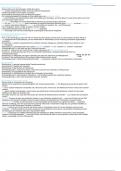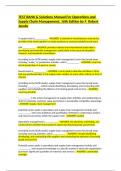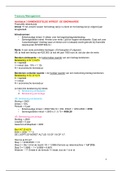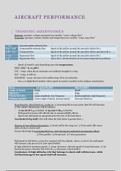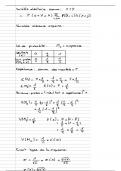Land Registration Act
‘In relation to the creation and transfer of rights in land, the Land Registration Act 2002 fails to
achieve its objectives.’ Discuss. [2016]
Thesis
In trying to strike the right balance between parties, the LRA 2002 undermines its own
objective of having a system of strict title by registration
Can be seen in instances of rectification and overriding interests
But e-conveyancing helps achieve LRA’s objectives
Objectives
Mirror principle: Register should be a complete and accurate reflection of the title to the
land
Curtain principle: Register should be sole and definitive source of information for purchasers
purchasers don’t need to go behind the ‘curtain’ to ascertain their interests
Insurance principle: If the register is inaccurate, protected financially because can claim
compensation
Objectives restated in Law Commission Report 2016: “clarity, finality, fact-sensitivity,
reliability of register”
Important that these principles are realized because they enhance economic efficiency of
land disposition
o No need to inspect old documents or have on-site inspection of land deduces
conveyancing costs
o Property buyers know that their rights are protected as long as it is registered, even
if there were mistakes in previous dispositions more confident and buoyant
property market
Rectification undermines mirror and curtain principle
Current system based on Sch 4 of LRA: Can alter the register to “correct a mistake”
o But if B is in possession of the land, can only correct if B has caused the mistake by
fraud or lack of care, or if it would be unjust to not make the alteration
o Also, if can rectify, must do so unless there are exceptional circumstances to justify
not doing so
Problem 1: Uncertainty as to what it means to “correct a mistake”
o Not defined in the LRA nor discussed in the Law Commission that preceded the Act
o Described by Gardner as “a tragic mess”
Problem 2: Uncertainty as to what constitutes a mistake
o Do we take a wide or narrow view of mistake when X fraudulently gives C a
registered charge?
Narrow view: C’s registration is not a mistake (Guy v Barclays Bank)
Broader view: X’s registration is a mistake, power to correct that extends to
C’s registration
Knights v Roberto Mac [where Cooper describes this approach as
the “long arm of the law of rectification”]
‘In relation to the creation and transfer of rights in land, the Land Registration Act 2002 fails to
achieve its objectives.’ Discuss. [2016]
Thesis
In trying to strike the right balance between parties, the LRA 2002 undermines its own
objective of having a system of strict title by registration
Can be seen in instances of rectification and overriding interests
But e-conveyancing helps achieve LRA’s objectives
Objectives
Mirror principle: Register should be a complete and accurate reflection of the title to the
land
Curtain principle: Register should be sole and definitive source of information for purchasers
purchasers don’t need to go behind the ‘curtain’ to ascertain their interests
Insurance principle: If the register is inaccurate, protected financially because can claim
compensation
Objectives restated in Law Commission Report 2016: “clarity, finality, fact-sensitivity,
reliability of register”
Important that these principles are realized because they enhance economic efficiency of
land disposition
o No need to inspect old documents or have on-site inspection of land deduces
conveyancing costs
o Property buyers know that their rights are protected as long as it is registered, even
if there were mistakes in previous dispositions more confident and buoyant
property market
Rectification undermines mirror and curtain principle
Current system based on Sch 4 of LRA: Can alter the register to “correct a mistake”
o But if B is in possession of the land, can only correct if B has caused the mistake by
fraud or lack of care, or if it would be unjust to not make the alteration
o Also, if can rectify, must do so unless there are exceptional circumstances to justify
not doing so
Problem 1: Uncertainty as to what it means to “correct a mistake”
o Not defined in the LRA nor discussed in the Law Commission that preceded the Act
o Described by Gardner as “a tragic mess”
Problem 2: Uncertainty as to what constitutes a mistake
o Do we take a wide or narrow view of mistake when X fraudulently gives C a
registered charge?
Narrow view: C’s registration is not a mistake (Guy v Barclays Bank)
Broader view: X’s registration is a mistake, power to correct that extends to
C’s registration
Knights v Roberto Mac [where Cooper describes this approach as
the “long arm of the law of rectification”]


